This brief report presents self-reports of recovery among adults aged 18 and older in the United States who thought they ever had a problem with their use of drugs or alcohol and/or mental health. These findings provide a clearer characterization of the factors associated with recovery among adults and how future efforts can foster a whole-health approach to sustain recovery from mental health and substance use conditions.
Dashboard: Filter Bricks
Main page content
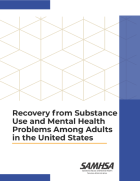
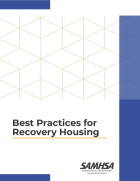
This document updates SAMHSA’s 2018 document and outlines best practices for the implementation and operation of recovery housing. These best practices are intended to serve as a tool for states, governing bodies, providers, recovery house operators, and other interested stakeholders to improve the health of their citizens, reduce incidence of overdose, and promote recovery housing as a key support strategy in achieving and sustaining recovery.
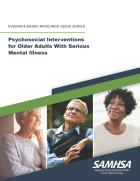
The guide provides considerations and strategies for interdisciplinary teams, peer specialists, clinicians, registered nurses, behavioral health organizations, and policy makers in understanding, selecting, and implementing evidence-based interventions that support older adults with serious mental illness.

This updated TIP reviews what is known about treating the medical, psychiatric, and SUD-related problems associated with the use of cocaine and methamphetamine, as well as the misuse of prescription stimulants. The TIP offers recommendations on treatment approaches and maximizing treatment engagement and retention, and strategies for initiating and maintaining abstinence.

This guide reviews literature on treating college students’ mental health concerns, such as anxiety, depression, and suicidal thoughts and behaviors; distills the research into recommendations for practice; and provides examples of the ways that these recommendations can be implemented.
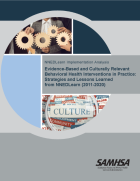
This report provides findings from a qualitative analysis of evidence-based and culturally relevant behavioral health practices offered at NNEDLearn, a SAMHSA training, offered from 2011 to 2020. It includes an overview of NNEDLearn, case studies, strategies and lessons learned, and conclusion.

This guide reviews ways that telehealth modalities can be used to provide treatment for serious mental illness and substance use disorders among adults, distills the research into recommendations for practice, and provides examples of how these recommendations can be implemented.
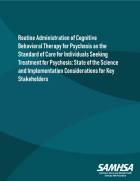
This guide provides mental health decision-makers (e.g., state/local mental health directors, treatment facility clinical directors, and other stakeholders) with rationale and evidence to support wide-spread expansion of Cognitive Behavioral Therapy for Psychosis (CBTp) across mental health systems.
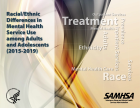
This chartbook uses combined 2015 to 2019 data from the National Survey on Drug Use and Health (NSDUH) to present nationally representative estimates of mental health service utilization among adults aged 18 or older and adolescents aged 12 to 17 within different racial/ethnic groups in the United States. The percentages are annual averages.
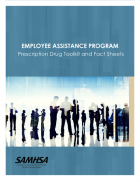
The EAP Prescription Drug Toolkit and Fact Sheets provide guidance related to counseling, referrals, and follow-up services (e.g., alternatives to prescription drugs, workplace drug misuse and relapse prevention, dangers of combined drug use, screenings, and evaluations before returning to work).
Displaying 1 - 10 out of 41

